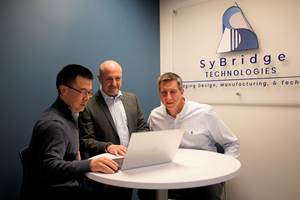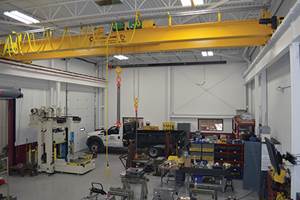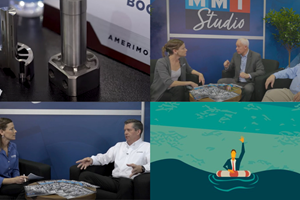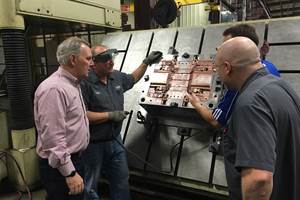Bottom Line: Personal Goodwill Indicates the Value of a Mold Shop for Sale
Carefully evaluating corporate and personal assets uncovers opportunities for significant tax savings when selling a mold business.
The issue of who owns goodwill (an individual or a company) has important tax and economic consequences. Personal goodwill can make a big difference when determining the value of a mold shop that is for sale. Personal goodwill represents intangible economic characteristics and the related intangible asset value that is attributable to an individual’s reputation, specific skills and knowledge, personal relationships, judgment, expertise, experience, personality, past success and management style.
An employee or shareholder of a corporation can own goodwill separately from the corporation if customers value the owner or employee (rather than the corporation) as the center of their commercial relationship. This is commonplace for mid-size and small mold shops. Personal goodwill characteristics are generally considered inseparable from the individual.
An employee or shareholder of a corporation can own goodwill separately from the corporation if customers value the owner or employee (rather than the corporation) as the center of their commercial relationship.
This is not the case for company goodwill, which represents those intangible economic characteristics and the related intangible asset value that is attributable to the business entity. Company goodwill examples include the company’s name, reputation, research efforts, location, facility, phone number, customer list and trained and assembled workforce.
Tax Impact
One major reason to value the level of personal goodwill in a business is because of the double taxation involved in the sale of assets that C Corporations hold. In the sale of a C Corporation’s assets, all gains are taxed at the corporate tax rate, which has a top rate of 35 percent. Soon the rate will be 21 percent, under the tax reform bill. The C Corporation must then distribute the proceeds of the sale to the shareholder. The proceeds are then taxed again at the shareholder level, typically at the capital gains tax rate of 23.8 percent (which is the qualified dividend rate of 20 percent plus the 3.8 percent Medicare surtax). However, if personal goodwill can be carved out of the sale and attributed to the business owner, and not as an asset of the corporation, the gain allocable to the personal goodwill from the sale is only taxed once, as personal assets of the shareholder are taxed at the capital gains rate of 23.8 percent.
One major reason to value the level of personal goodwill in a business is because of the double taxation involved in the sale of assets that C Corporations hold.
Economic Impact
When the C Corporation has more than one owner, the economic impact of the sale can be affected if a portion of the purchase price is allocable to personal goodwill, and that personal goodwill is not proportionate with the ownership interests. For example, Adam and Mike each own 50 percent of XYZ Mold Builders, which is taxed as a C Corporation in the sale of all of the assets for $4 million. In allocating the purchase, the valuator determined that $3 million is allocable to the business’ assets, $750,000 to Adam’s goodwill and $250,000 to Mike’s goodwill. In this example, Adam will recognize greater proceeds from the sale, since more of the purchase price was allocated to the personal goodwill that he owned.
Available Guidance
The most frequently cited personal goodwill case is Martin Ice Cream, Petitioner v. Commissioner of Internal Revenue, Respondent, the 1998 court decision that gives authority to the separate treatment of personal and business goodwill. Arnold Strassberg, an ice cream industry veteran, and his son Martin jointly owned a wholesale ice cream company. The two disagreed about how the business should be run, so they divided the company in two.
Arnold decided to sell his side of the business to Häagen-Dazs for $1.5 million. Relative to the taxes associated with the sale, Martin Ice Cream contended that the majority of the value was actually the personal goodwill Arnold had built over a long industry career. As personal goodwill, the gains would be taxed at Arnold Strassberg’s capital gains rate. The IRS contended that the sale proceeds should be attributed to Martin Ice Cream and taxed at the corporate rate.
The tax court ruled against the IRS, agreeing that these intangible assets were the property of the shareholder. So, the value of those assets was not included in the value of the corporate sale. The Martin Ice Cream case underscores the opportunities available for significant tax savings in a business sale. Carefully evaluating corporate and personal assets can help shop owners avoid a major tax burden.
Final Factor
In the sale of a business, personal goodwill itself cannot be transferred. However, the rights to one’s goodwill can be transferred. If an individual signs a non-compete or any other employment agreement, his or her personal goodwill may actually be considered an asset of the company. Therefore, verify that the key individual(s) did not sign a non-compete or any other employment agreement before trying to allocate personal goodwill.
About the Contributors
Michael J. Devereux II, CPA, CMP
Michael J. Devereux II, CPA, CMP is a partner and director of Manufacturing, Distribution and Plastics Industry Services at Mueller Prost LC.
Adam Herman, CPA/ABV/CFF, CVA, ASA, CFE
Adam J. Herman, CPA/ABV/CFF, CVA, ASA, CFE, is a partner and chief visionary officer for Mueller Prost LC who regularly advises manufacturers in the exit of their businesses.
Related Content
Transforming Moldmaking into Digital Industrial Manufacturing
Moldmaking and digitalization is at the core of this global industrial manufacturing company’s consolidation and diversification plan.
Read MoreThe Trifecta of Competitive Toolmaking
Process, technology and people form the foundations of the business philosophy in place at Eifel Mold & Engineering.
Read MoreFrom Injection Mold Venting to Runnerless Micro Molds: MMT's Top-Viewed June Content
The MoldMaking Technology team has compiled a list of the top-viewed June content based on analytics. This month, we covered an array of topics including injection mold venting, business strategies and runnerless micro molds. Take a look at what you might have missed!
Read MoreOEE Monitoring System Addresses Root Cause of Machine Downtime
Unique sensor and patent-pending algorithm of the Amper machine analytics system measures current draw to quickly and inexpensively inform manufacturers which machines are down and why.
Read MoreRead Next
Using Nontraditional Technology
MoldMaking Technology editorial advisory board (EAB) member Gabe Meldrum of CIE Century Plastics Inc. shares his take on finding and using new technologies to grow a business, such as waterjets and additive manufacturing.
Read MoreHow to Use Continuing Education to Remain Competitive in Moldmaking
Continued training helps moldmakers make tooling decisions and properly use the latest cutting tool to efficiently machine high-quality molds.
Read MoreReasons to Use Fiber Lasers for Mold Cleaning
Fiber lasers offer a simplicity, speed, control and portability, minimizing mold cleaning risks.
Read More.jpg;maxWidth=970;quality=90)

















.jpg;maxWidth=300;quality=90)







